This past summer, Millsaps College students participated in a hands-on research expedition led by Dr. Brent Hendrixson, professor of biology. From July 15 to August 7, Dr. Hendrixson and his students traversed the American Southwest, exploring the diverse landscapes of Arizona, California, Nevada, New Mexico, Texas and Utah.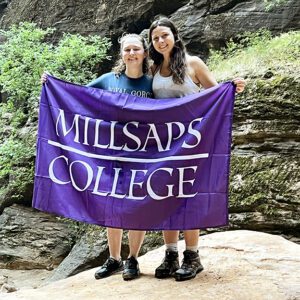
“Unlike many programs where research opportunities are often reserved for graduate students, Millsaps students can participate in rigorous fieldwork experiences as undergraduates that expose them to real-world applications of what they have learned in the classroom,” explained Hendrixson. “This project involved collection-based research in some of North America’s hottest and most challenging environments.”
A Journey Across Diverse Ecosystems
The expedition was far from a typical academic experience. Dr. Hendrixson, accompanied by four Millsaps students—Chloee Beebe, Katie Williams, Charlie Barnes and Sarah Strickland—traveled over 7,000 miles, collecting scorpions, tarantulas and other arachnids across three major deserts: the Chihuahuan, Sonoran and Mojave. The trip allowed the students to immerse themselves in the diverse ecosystems of the Southwest, from the scorching desert valleys to the cool mountain ranges that rise above 9,000 feet in elevation.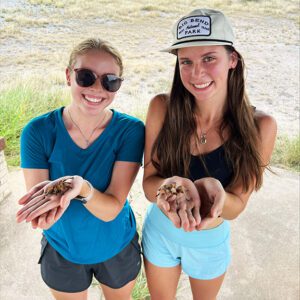
“The primary goal of this trip was to search for specific species of scorpions and to document their distributions, but we encountered a wide range of other critters, including vinegaroons, camel spiders and giant wolf spiders,” said Dr. Hendrixson. “It was an incredible experience for the students, many of whom had never seen these animals in their natural habitat.”
Real-World Research Experience
One of the trip’s main objectives was to gather specimens for various research projects, including Chloee Beebe’s honors work. “We were searching for scorpions in the area,” said Chloee. “Specifically for my project, we were looking for a newly discovered population of scorpions in the Mojave Desert to determine if it is a new or unknown species.”
Dr. Hendrixson also used the trip to collect specimens and photographs for his upcoming book, “The Scorpions and Tarantulas of the United States,” set to be published by Princeton University Press.
Beyond collecting samples, the students were deeply engaged in the scientific process, learning to navigate the practical challenges of field research. “The weather was one of the biggest challenges,” Dr. Hendrixson explained. “Temperatures soared as high as 121 degrees in Palm Springs, and the summer monsoon season brought in humid air that made conditions even more difficult. The students also had to navigate around prickly desert plants and the occasional run-in with rattlesnakes.”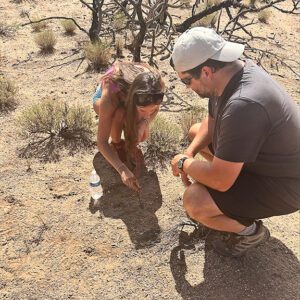
Building Connections Beyond the Classroom
While the research was a crucial component of the trip, Dr. Hendrixson emphasized the value of the time spent outside the classroom and lab. “The best part of these trips is honestly just hanging out with the students and getting to know them better,” he shared. “We learned about each other’s goals, motivations and even our worries. There’s nothing better than road-tripping, hiking and camping together.”
For the students, the experience provided a unique blend of academic rigor and personal growth. “They were mesmerized, learned a lot and had a lot of fun,” Hendrixson reflected.
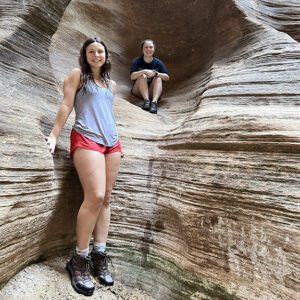 “My favorite thing about the trip was not only being able to apply everything I’ve learned in the lab to the field but also spending time with my classmates and Dr. Hendrixson,” Charlie said. “The professor and the students truly make a difference in the quality of the trips, and it made learning about scorpions and camping enjoyable!”
“My favorite thing about the trip was not only being able to apply everything I’ve learned in the lab to the field but also spending time with my classmates and Dr. Hendrixson,” Charlie said. “The professor and the students truly make a difference in the quality of the trips, and it made learning about scorpions and camping enjoyable!”
Foundation for Future Research
The data and specimens collected during the trip will contribute to Dr. Hendrixson’s broader research goals, which include documenting arachnid diversity and understanding their evolutionary relationships. “Each specimen contains genetic information that holds a lot of secrets,” he explained. “A major goal of my research program is to unlock those secrets that reveal fascinating stories about their evolutionary history.”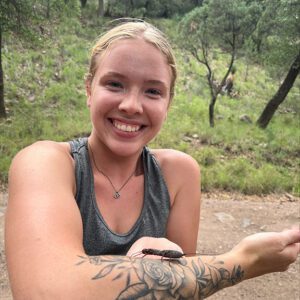
By offering these kinds of hands-on experiences to undergraduates, Millsaps College stands out as an institution committed to providing students with real-world research opportunities early in their academic careers. These experiences not only enhance students’ understanding of their field but also prepare them for future academic and professional endeavors.
“I learned so much on this trip. Being in the field allowed me to take what I have learned in my classes and put it into action,” said Strickland. “It was such a special opportunity to see what Dr. Hendrixson does and it has inspired me to pursue a career in wildlife biology. It’s so special that Millsaps offers opportunities like this and I encourage all students to take advantage of trips like these.”
As Dr. Hendrixson’s summer research trip demonstrates, experiential learning is more than just a buzzword at Millsaps—it is a cornerstone of the educational experience, providing students with the skills, knowledge and confidence to excel in their future careers.
